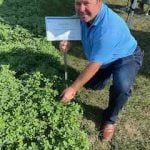Investigators search for source | Biosecurity lapses can have deadly consequences for barns
Manitoba has confirmed its fifth case of porcine epidemic diarrhea, this one in southeastern Manitoba beyond the five-kilometre buffer zone of the last two farms with positive diagnoses.
Investigators are trying to determine the source of the disease at each of the three new sites.
“The producers that are affected are really doing nothing much worse as far as biosecurity goes from what we see everywhere else in the industry,” Mark Fynn, an animal care specialist with Manitoba Pork Council, said during a conference call Oct. 3.
Read Also

Agriculture ministers commit to enhancing competitiveness
Canadian ag ministers said they want to ensure farmers, ranchers and processors are competitive through ongoing regulatory reform and business risk management programs that work.
Tight biosecurity measures have become critical to controlling the disease.
Awareness is growing about the devastating effects of the virus, but not all farms and service providers are following the guidelines. Millions of pigs have died in the United States in more than 30 hog producing states.
Canada has had 70 positive cases in Prince Edward Island, Quebec, Ontario and Manitoba.
“In our disease investigations, we are starting to identify some serious lapses in biosecurity,” Fynn said.
“Almost everyone we have talked to had at least one or two minor lapses of biosecurity on their site.”
He said producers have the responsibility to protect their farms.
“Trust me, you don’t want to get the disease,” he said. “The emotional toll is huge on the affected producers. If you are looking at a sow site, you are killing piglets for four weeks. It is really tough on the staff and workers.”
The virus more commonly strikes in cooler weather, so increases were anticipated during this fall and winter.
“As winter comes along and the presence of more PED virus in the environment in Manitoba, we have to continue to be very diligent, especially with our transport biosecurity,” Fynn said.
Clinical signs of PED include diarrhea, fever, vomiting and newborn deaths.
Alberta swine veterinarian Egan Brockhoff of Red Deer said it is almost certain death for piglets, but mature animals have also been stricken.
“In adult pigs, this disease is very subtle,” he said.
“A lot of time is going by before people are identifying it.”
Often, hogs have been moved off the farm and new ones brought in by the time the disease is diagnosed in sows and late finishers, which increases the risk of spread.
“We really need to be paying close attention to any loose stools in your grow-finishing and mature breeding herd population,” he said.
Alberta has collected nearly 4,500 samples, and all were negative. Swabs were taken at farms and high risk areas, such as transfer sites, assembly yards and truck washes.
Zoetis just received a conditional licence for a two dose, killed vaccine for sows in the U.S.
The treatment is similar to an earlier registered vaccine and is labelled only for control in endemic herds.
It will not prevent infection but can help control the disease and stop a complete disaster.
Other preventive measures in-clude avoiding feed containing dried blood plasma, which has not been definitively cleared as a cause in spreading of the disease.
“Grossly contaminated feedstuffs can serve as a vehicle for PED infection in pigs,” said veterinarian Frank Marshall.
Feed treatments are also under scrutiny.















